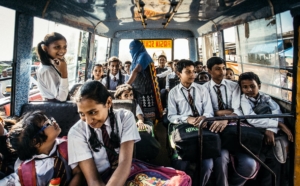How Ekal Vidyalaya is Adapting for Indian Children
 In India, literacy and education stand as critical tests to measure success, whether in future prospects for the individual or future success for a community. After the end of British rule in the nation, the literacy rate stood at about 12%. Today, the rate has more than quintupled to nearly 70% across the nation. Even so, disparities exist across villages, provinces and states. To tackle these issues and advance the education of India’s next-generation, a non-profit organization is helping the children in the midst of a global pandemic. Ekal Vidyalaya is adapting for Indian children, continues to build schools, prioritize sustainability and maintain ambitious objectives from a variety of different chapters across not just India, but around the world.
In India, literacy and education stand as critical tests to measure success, whether in future prospects for the individual or future success for a community. After the end of British rule in the nation, the literacy rate stood at about 12%. Today, the rate has more than quintupled to nearly 70% across the nation. Even so, disparities exist across villages, provinces and states. To tackle these issues and advance the education of India’s next-generation, a non-profit organization is helping the children in the midst of a global pandemic. Ekal Vidyalaya is adapting for Indian children, continues to build schools, prioritize sustainability and maintain ambitious objectives from a variety of different chapters across not just India, but around the world.Initial Difficulties and Welcome Surprises
As a non-profit, Ekal Vidyalaya delivers various resources and instructional services through its village-to-village outreach. Establishing schools with a teacher impacts a previously education-lacking community in significant ways. Before the pandemic, various Ekal Vidyalaya’s chapters would host different events per year to raise funds to allow various programs to continue. The Chapter President Senthil Kumar detailed to the Borgen Project how typical efforts would no longer be viable this year. Kumar shared that most of the average fundraisers are cultural events for local Indian communities in various parts of the world. It drew in between $70,000 and $100,000. He carefully notes that just “$1 can keep a school open for a day.”
Moreover, Ekal Vidyalaya seeks to grow its impact in communities 10-20% more than last year. Because of significant differences across India’s economic, geographical and social landscape, funding necessities can vary. In addition, transitioning to online events has its own advantages. Local gatherings can still survive in digital spaces. Because annual events usually bring in singers, actors, and other notable icons from India, overhead fees can be entirely forgoed. Empty seats in auditoriums are not concerns over Zoom or similar platforms. As a result, this diverts resources to more directly meet program financial targets. It makes a tangible change for rural children and has allowed the same level of grassroots fundraising to persist, according to Kumar. Adapting for Indian children might mean venue changes and alterations from a traditional schedule. However, it seems that sacrificing the fundamental missions is not an insurmountable concern.
An Implementation Landscape: Three Things to Know
-
Kumar told The Borgen Project that “[About 30%] of all schools are self-sustaining.” He spoke on the long-term ability of Ekal Vidyalaya to support students and communities to utilize and provided tools for future improvement. The Standard Social Innovation Review points to “scale and scarcity.” They are the two most essential obstacles that nonprofits and organizations working in India have to overcome. To that end, Ekal Vidyalaya continues to strive forward to meet its ultimate goal of total literacy across India. With well over 120,000 schools running, supported by trained volunteers and others, a necessary review of financial disbursement comes into the forefront.
-
The usage and allocation of the fund play a crucial role in a nonprofit’s vision. According to Kumar, funds Ekal Vidyalaya raises are divided into the following amounts: 60% is set for teachers and teaching, 27% is for training and capacity, 4% is dedicated for teaching materials and 9% is used for administrative costs. While these numbers alone don’t necessarily signal direct change, a key signifier of the nonprofit’s attentiveness to its mission. By extension, its effectiveness is its recent shift in order to facilitate adapting for Indian children and families during the COVID-19 pandemic.
-
Efforts in towns and communities, outside of Ekal villages, highlight wide-scale mask distributions and food outreach. There is also information campaigns that make use of Ekal resources to protect Indian communities. The teachers and volunteers served as health volunteers in many situations. Additionally, they keep villages and tribal areas safer under guidelines through checks that might have otherwise been difficult to establish and enforce. While the situation has changed, useful approaches using existing resources also testify to the resiliency of Ekal villages. In many areas, trained villagers are taught through school programs and skills sessions to manufacture materials like face masks. This is to ensure reliable incomes and necessary local health support.
The landscape that Ekal Vidyalaya functions on is perpetually shifting. However, it isn’t beyond the reach of sustained communal efforts and careful elasticity when meeting new intentions and ambitions. Even in light of a public health crisis, Ekal Vidyalaya’s work extends beyond a single facet of nonprofit capability. Due to the nature of its support and of where it’s positioned, Ekal Vidyalaya bears the capacity for change. This change happens in the relatively short term and in the long term. The education, literacy and future of millions of India’s next-generation depend on this.
– Alan Mathew
Photo: Pexels
